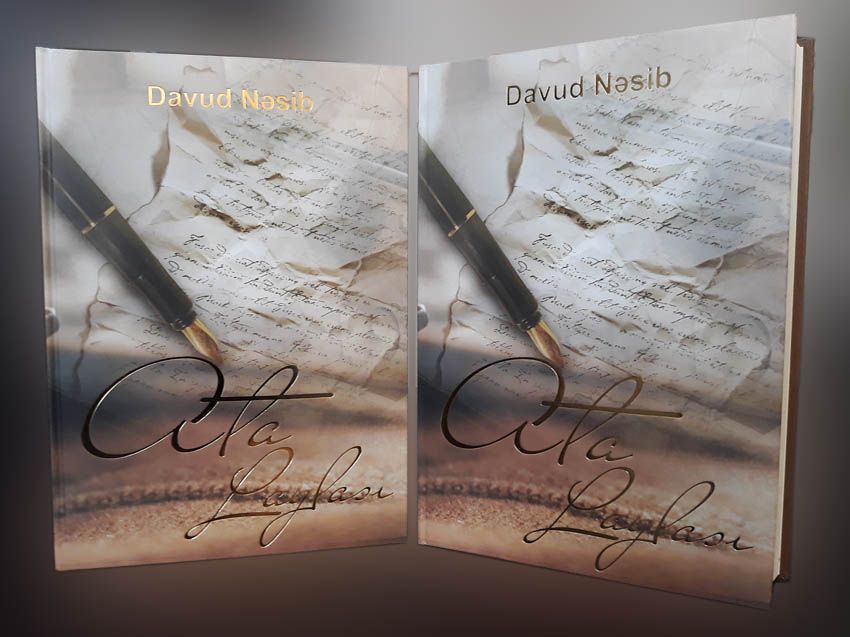“Fathers and Sons”
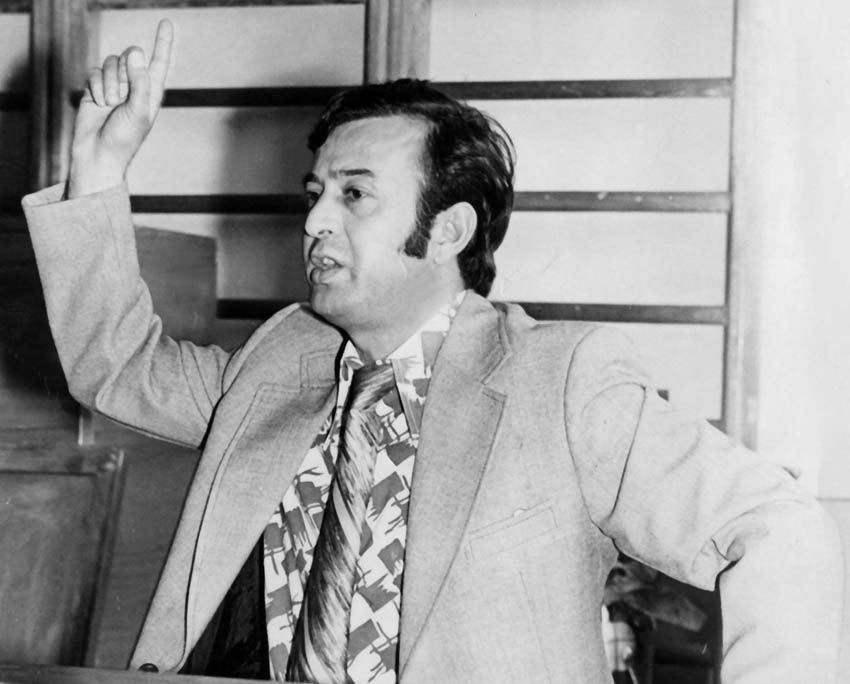
In the project "Fathers and Sons" of the website Modern.az, famous intellectuals, like academics, cultural figures, artists, sports figures, writers, as well as public and political officials, tell the life stories of their father raising them. Like, they characterize the life path of their fathers. Not only with the help of writings, but also with the speech of photos…
And also the sons of famous fathers speak about their fathers who have died, revive their images before our eyes.
Our next guest of the project, Khayyam Nasibov, the son of the late poet, one of the most original writers of contemporary Azerbaijan poetry Davud Nasib, will share his memories and heartfelt words about his father.
A NAME BY THE LONGING FOR A DAD
Poet Davud Nasib started his poetry with rhymes about the longing for a Dad. He was born while his father was in the war, as if the longing for the Dad whom he never saw, held his hand to raise him from Davud to Davud Nasib. It changed him from a child of a war period to a well-known writer of the poetry. Let’s listen to the writer’s son:
-First of all, on behalf of our family we thank you for this initiative. Your interest to the well-known poet, the writer of the people of Azerbaijan Davud Nasib, makes us, his children proud. My father was the last-born child in the family of seven children. All of his elder siblings had seen their father Majid. My grandfather decided to name the child himself, although he had gone to the front line when his last born child- Davud Nasib was born. When my father was born my late grandmother sent a letter to the battle field telling that she wanted to call the child "Zahid". But my grandfather objected telling:"Call him Davud, not Zahid".
-Thus, my father was named Davud by his father, and Davud Nasib by his father’s longing.
TALKING TO PICTURES...
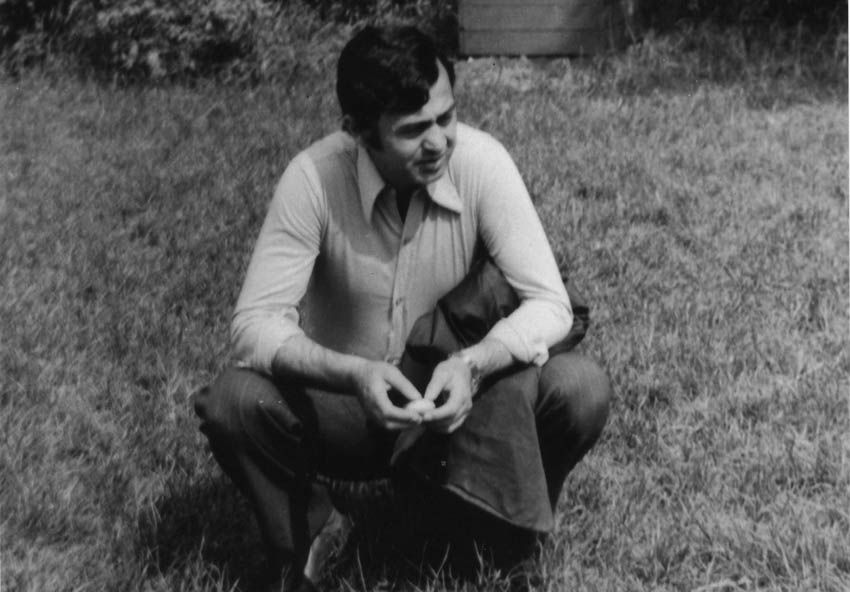 -Davud - The longing for his Dad gave Davud Nasib the major impetus in the poetry, this is what he said several times. We were kids, but were surprised feeling his pain when we were five or six years. We were amazed to see such a love, respect and affection that my father had for his dad whom he never saw. Personally, I have witnessed: My father was sometimes talking to my grandfather’s picture. And these were the feelings Davud Nasib opened a new path in the poetry with. Professor Nizami Jafarov and other intellectuals note that Davud Nasib is the only person who came to the poetry with the topic "Father".
-Davud - The longing for his Dad gave Davud Nasib the major impetus in the poetry, this is what he said several times. We were kids, but were surprised feeling his pain when we were five or six years. We were amazed to see such a love, respect and affection that my father had for his dad whom he never saw. Personally, I have witnessed: My father was sometimes talking to my grandfather’s picture. And these were the feelings Davud Nasib opened a new path in the poetry with. Professor Nizami Jafarov and other intellectuals note that Davud Nasib is the only person who came to the poetry with the topic "Father".
70 percent of his rhymes are in this topic. Even now I become excited when I read those rhymes. Sometimes, being tired, or sad, or when my heart is full, I stay alone with the rhymes. I talk to the rhymes like my father did to his father’s picture…I say this, not because, he is my father- this is the opinion of many people – the topic – the longing for a Dad- finds its full reflection in his rhymes with its natural feelings and life experience.
"MY SON’S FAIRY TALES"
-My father has a poem, "My son’s fairy tales", he dedicated this poem to my elder brother. It is really, a very nice and touching poem. So, in the poem, the loss of his father has left such a deep mark in him, that he got his smell from his child. Marched from the war theme to a love of children, to our becoming worthy successors of him. He says: "I didn’t see any toys in my childhood, but your crib is full of toys". He would tell us fairy tales through the war and longing for his father… In this "fairy tale" of my father, and also in his life story the losses and longings were following him.
The second big loss after his father, was his brother’s- Magsud Nasibov- death. Magsud was very close to his brother since the childhood. I can say with full confidence that they also had very strong friendly relations. I want to note that, Magsud Nasibov was a farm director named after Samad Vurghun. He remained in memories as a benevolent and honest person in the region. We were feeling how our father was getting more and more sensitive, and was fading like a flower after my uncle’s death. A year before his brother’s death, he had lost his sister, and then his mother. As if, the losses themselves were writing my father’s rhymes.
That’s why he dedicated many rhymes to the theme "brother". After the hard war years, after getting out of the difficulties of life with oppression, in prosperous times, it was so disappointing for him to lose his brother and sister… He would say this himself…
"MY FATHRE’S FRIENDS"
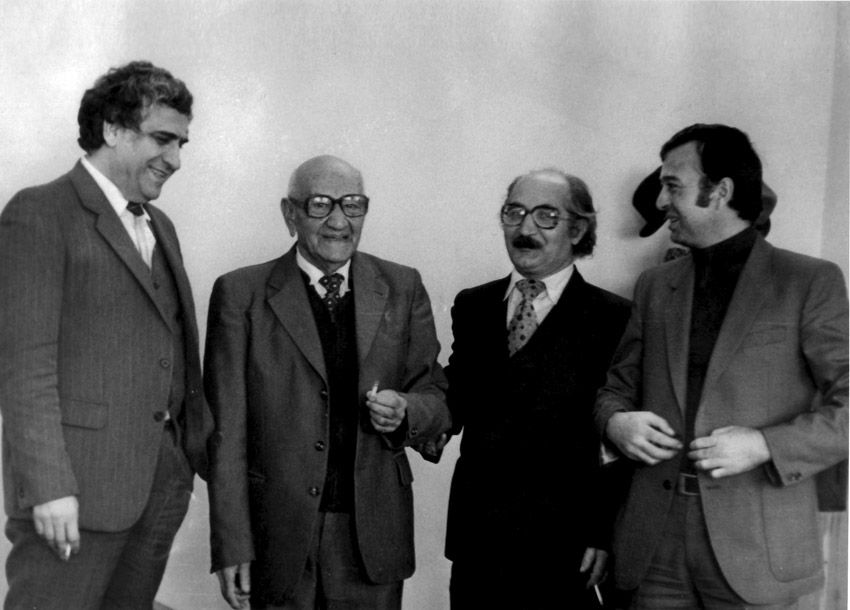 -Davud
-Davud
-Davud Nasib was also a great friend. I am not the only one saying this, but also many intellectuals, all of his colleagues confirm this.
Everyone envied my father for his friendship. Until now, it is before my eyes- he was so sensitive, attentive, loyal and assiduous. Academicians Ziya Bunyadov, Teymur Bunyadov, national poets Nariman Hasanzadeh, Gabil, poet Nusrat Kasamanli, famous intellectuals Gazanfar Pashayev, Ayaz Vafali, Nizami Jafarov know how my father was loyal and sensitive in his friendship.
He was really very sensitive in his friendship. If a friend had a problem, or was ill, my father would keep him under control during several days, and deeply worry about his mood.
Nabi Khazri was a teacher for Davud Nasib in the poetry. Poetics, of course, is in the nature of a person, talent is an internal, spiritual factor. He would share his rhymes mostly with Isa Huseynov and Nabi Khazri. After writing new rhymes, he would call these two up, and they would discuss the rhymes half- jokingly. Sometimes they would give advice to each other. My father’s friends would constantly gather in our two-room flat, and would have parties from mornings till evenings. It still surprises us, how my late mother Makhfirat welcomed so many guests in the two-room flat. Makhfirat khanum played a great role in poet Davud Nasib’s life. Everyone knows that, creative people have sensitive, quick tempered and irregular ways of life. All of the mentioned factors were regulated by our mother. Although it was very difficult and responsible, our mother would fulfill this duty with honor and love.
MEMORIES WITH WOLF ANGRY
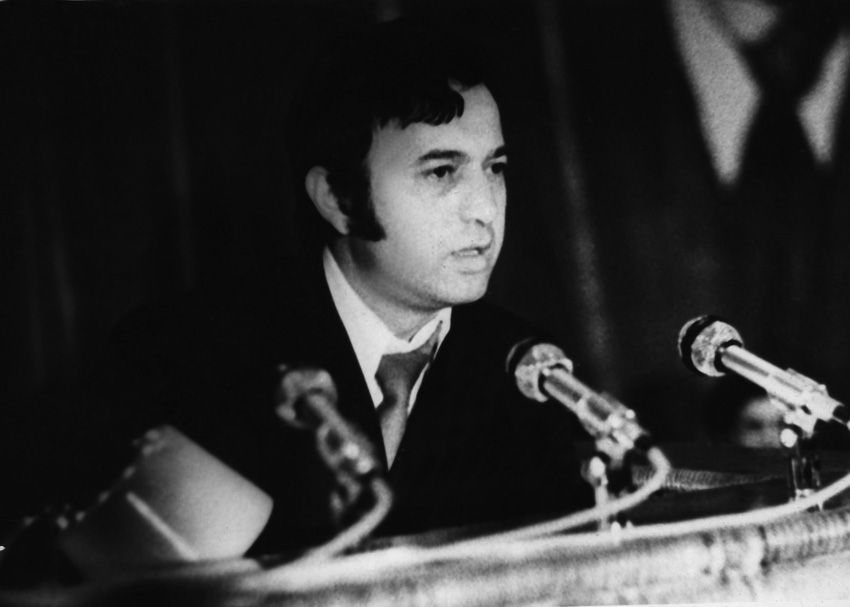
Fatherlessness was always a help to Davud Nasib in his creative activity. He was inspired by this shortcoming, he changed this longing into a rhyme. But fatherlessness, on the other hand, took something from the poet’s life. For example, his carefree childhood years…
His son Khayyam Nasibov shares his interesting memory about Davud Nasib of those years.
These were difficult years after the war. My father’s elder brother Ali, was a father-substitute in the family after my grandfather’s death. He became responsible in the family management. They were 3 brothers and 4 sisters in the family. I want to emphasize that, my grandmother Insan khanum had an invaluable role in raising these 7 children. This reflects in my father’s rhyme "I would like to have seven children". Ali Muallim would have an opportunity to work only in the evenings, because of his study. His middle brother uncle Magsud and my father had to deal with the main difficulties. Every day they would go from Gazakh to the village Mughanli to work on pasture land of the farm. They would provide their mother and their four sisters at home with food-stuffs. Once, my father was coming from Gazakh to Mughanli at nighttime. First he had to go to Aghstafa by train, then from there to Mughanli. And there was a dense Garayazi forest between the region and the village. The conductor didn’t want to let my father go, saying that he was a child, how he could go through the forest?! He could come across wolves at night. But my father wasn’t thinking about this, but only about going to Mughanli, getting food-stuffs from there and returning home quickly. So, when he was going in the forest he suddenly came across a wolf. Imagine, cold, freezing weather, a little kid and a hungry wolf… My father took a match out of his pocket, lit it, and this way didn’t let the wolf come closer. The matches went out quickly because of the freezing weather. In the end, he saw that there was only one match left. With the match he set light to his handkerchief- every time talking about this incident he would say that, he thought it was the end- but suddenly, bright lights of a car fell from behind, and the wolf got frightened and ran away. The men in the car took my father to the village. After sitting in the car he couldn’t say a single word for half an hour. He didn’t answer to their questions…
Bread of those years was earned in this way…
SAVING OF THOSE YEARS
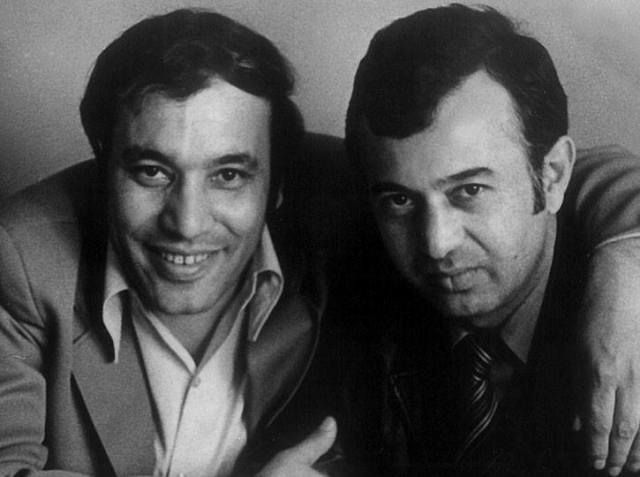
But the years, Khayyam speaks about, leave a saving for Davud – KINDNESS! Davud nasib wouldn’t betray this saving till the last years of his life:
- It was the result of his effort, his suffering in his childhood, that he helped many young people as much as possible when he was the head of the department of the newspaper "Literature and the Art" ( later called "Newspaper of Literature" – E.N.).
He used to give an impetus to those, whoever had a little bit talent. Sometimes he would make corrections in their rhymes by himself. He did so, because he didn’t want that young author to despond. Our distinguished poet Nariman Hasanzadeh was the editor –in-chief of the newspaper then. Later he would say: "I kept telling Davud: Davud, there are some rhymes that don’t worth publishing". But in order to encourage the young man, he would make corrections in those rhymes, and would certainly send them for publication.
Davud Nasib and the chairman of the union of Soviet writers Anatoli Ivanov were close friends. When a writer, or other close people wanted to go to Moscow from Baku, my father would call him, and after exchanging greetings would tell that his close relative was going to visit him. And Anatoli Ivanov would meet all his needs in Moscow for Davud Nasib’s sake. He would help so many people among his close relatives in the village to study at University in Baku…
A MUST-READ NOVEL- "JAVANSHIR"
The novel "Javanshir" is a work for which Davud Nasib devoted 20 years of his life. He turned the idea, which he created in himself during a dispute with an Armenian, into a novel. His goal was to prove the real history of Azerbaijan to that Armenian and others like him. His son mentions interesting points about this:
-My father devoted 20 years of his life for the novel "Javanshir", carried out many investigations, benefited many of the necessary sources. The idea for writing the novel has an interesting history. So, in Moscow, while studying at the Institute of Literature named after Maksim Gorki, my father had a dispute with an Armenian student. When that student was using false facts in his speech about historical topics, my father decided he needed to deeply study his nation’s history of this big. The novel "Javanshir" was written to this end. While writing the novel he conducted research on the history of Azerbaijan of middle ages. His friendship with scientists like Ziya Bunyadov and Budag Budagov began at that time. We were children then, passing by Lake Didivan in Gazakh by "Vilis" cars, my father would tell interesting historical facts about every inch of the territory. He had investigated so much, that everywhere was familiar to him. For example, about that territory, he would say that, Javanshir’s father’s grave was there. Let me talk of an interesting episode: So, there were a lot of sources about Ancient Albania in the church Uchmuadzin. Because this church belonged to Albania, a land of Ancient Azerbaijan. It was Soviet times, they knew, that Armenians wouldn’t let them in the church. So, they played a trick: there was a historian Voroshil Gukasyan, a man studying Caucasus, with Udi origin among them. He was a scientist and a citizen of Azerbaijan with Udi origin. Simply, his surname was like an Armenian surname, so his entry into the church was more real. However, after a while of his entry into the church, they knew that he was Azerbaijanian and dismissed him from there. My father got unique facts about Javanshir from the famous Hermitage Museum in St Petersburg. The novel was also written with foresight. In the novel, which was started to be written in 1980, Javanshir was also described as a great diplomat and a politician. Besides, there are also some useful facts contrary to Armenians in the novel. In other words, it is a prose written by great patriotic determination. My father wanted to test himself also as a prose-writer.
A DESK AND PAPER TO SHARE GRIEFS WITH
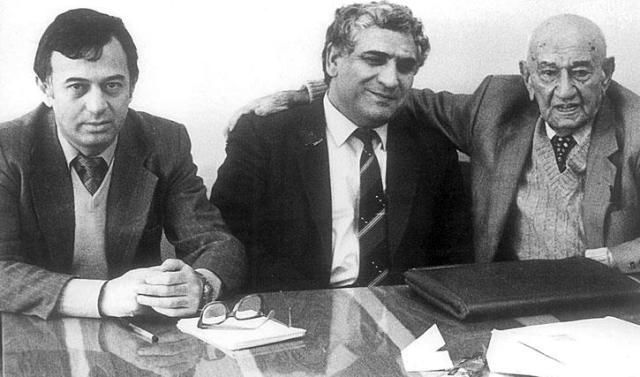
His desk, paper and pens were also Davud Nasib’s partners to share the griefs with. He spoke to them, and shared his thoughts with them. The rhymes arising as a result of these communications are saving from him:
-My father would write his works, his rhymes in the kitchen. We would wake up at night and find him working very hard, he would work until morning. But he wouldn’t speak about his work, or things happening at work. What we could see, we saw ourselves. But he wouldn’t carry home anything happening at work. He had cordial relations with us, like friends. But anyway, he wouldn’t share the work with the family, perhaps, he didn’t want to load us up with negative things. He would tell the paper his secret of the heart. His close friends also know, that my father was a man to tell his words right to a face. If one was wrong, my father would tell it to his face. And he would transfer to paper anything being a load for his spirit. As if, he found relief in this way. He never spoke of his favor. What I have mentioned above, are the things I saw myself. He would advise us the same things, to be a close-knit family, to be a loyal friend, to have transparent relationships.
A PORTRAIT OF THE WAR PERIOD
With the help of his rhymes you can get acquainted with Davud Nasib of 1988-1993 years, the years of heavy fighting, when chaotic social-political sight was reigning. But before that, let’s listen to his son. Khayyam is portraying Davud Nasib of those years with words:
-My father was a very patriotic man, was connected with his nation, his people. My brother went to the front line after finishing military department. At that time, in 1996, the war just slowed down, but frontline situation still remained serious. Believe me, my father was so proud that my brother was serving on the front lines… In meetings with soldiers, he kept saying that his son was serving on the front lines. He was very glad for raising such a good son. During the war, when our land was occupied, he couldn’t get over it by any means. He was shaken by the everyday news of martyrs from the battlefield. He would collect aid and send to the battlefield. Also, he would personally take the aid to the front. He sometimes would make his acquaintances join the aid campaign…
The rhymes written by him in those years, can introduce Davud Nasib of that period, the best. My father’s pain, his sufferings caused by the war, by the loss of land, are all in those rhymes…
"BILGAH SORROW"
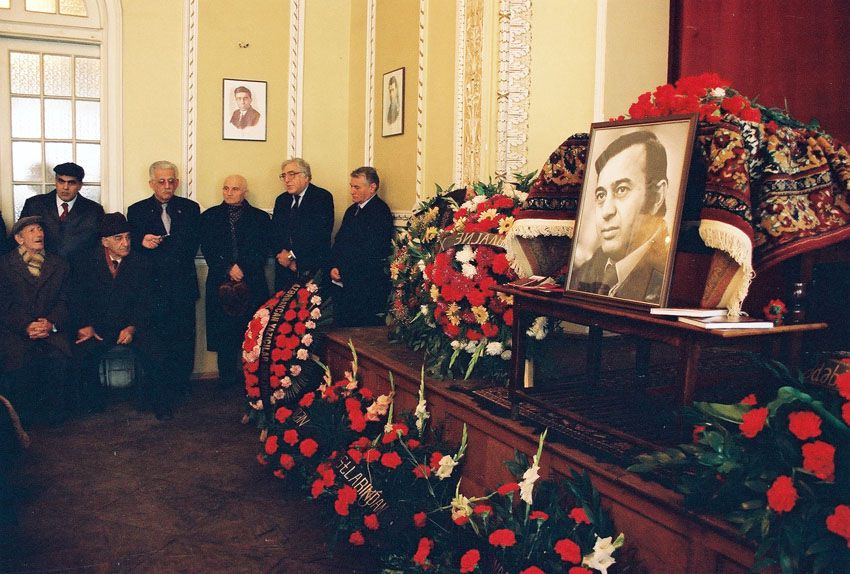 Davud
Davud
Davud Nasib’s death was very tragic. He died in a car accident in 2003. He could do a lot more, he could write more works. But the tragedy on the short way home from work was inevitable. In one photo he is pointing the time: 11:45. What a coincidence, the writer’s death was on the same minute: 11:55. After all, let’s introduce Davud Nasib to you via his son with these two details. Poet Davud Nasib who was so sensitive to feel 11:55:
-We bought a new summerhouse in Bilgah. And we wanted to put everything in the yard in order. We burned the dry grass. There are some birds that nest in grass, the thing is, one of them settled in our yard. The nest and baby birds also burned with the grass. Since then, two birds, probably their parents, would fly to the veranda every day, and sing their elegy from there. My father was badly affected by this event. He kept saying: I always write about my father’s house, about my dwelling, but I burned a nest".
Later on, he couldn’t stay in that summerhouse, and we sold it…
This was my father- a man who couldn’t stand a destroyed nest of a bird…
"A FATHER COAT"
-He had a touching rhyme called "A father coat". The children of a father, who has gone to war, get his smell from his leather coat. But nobody puts it on, as if they don’t feel ready to put the coat on… Maybe, now my father’s rhymes are the coat in that rhyme for us…
E. Nazimoghlu


